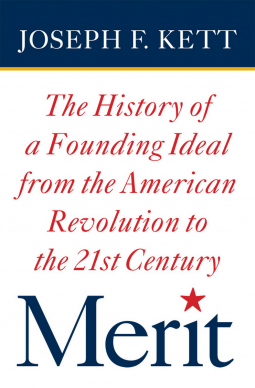
Merit
The History of a Founding Ideal from the American Revolution to the Twenty-First Century
by Joseph F. Kett
This title was previously available on NetGalley and is now archived.
Send NetGalley books directly to your Kindle or Kindle app
1
To read on a Kindle or Kindle app, please add kindle@netgalley.com as an approved email address to receive files in your Amazon account. Click here for step-by-step instructions.
2
Also find your Kindle email address within your Amazon account, and enter it here.
Pub Date Jan 15 2013 | Archive Date Feb 17 2013
Description
The idea that citizens' advancement should depend exclusively on merit, on qualities that deserve reward rather than on bloodlines or wire-pulling, was among the Founding ideals of the American republic, Joseph F. Kett argues in this provocative and engaging book. Merit's history, he contends, is best understood within the context of its often conflicting interaction with the other ideals of the Founding, equal rights and government by consent. Merit implies difference; equality suggests sameness. By sanctioning selection of those lower down by those higher up, merit potentially conflicts with the republican ideal that citizens consent to the decisions that affect their lives.
In Merit, which traces the history of its subject over three centuries, Kett asserts that Americans have reconciled merit with other principles of the Founding in ways that have shaped their distinctive approach to the grading of public schools, report cards, the forging of workplace hierarchies, employee rating forms, merit systems in government, the selection of officers for the armed forces, and standardized testing for intelligence, character, and vocational interests. Today, the concept of merit is most commonly associated with measures by which it is quantified.
Viewing their merit as an element of their selfhood—essential merit—members of the Founding generation showed no interest in quantitative measurements. Rather, they equated merit with an inner quality that accounted for their achievements and that was best measured by their reputations among their peers. In a republic based on equal rights and consent of the people, however, it became important to establish that merit-based rewards were within the grasp of ordinary Americans. In response, Americans embraced institutional merit in the form of procedures focused on drawing small distinctions among average people. They also developed a penchant for increasing the number of winners in competitions—what Kett calls "selection in" rather than "selection out"—in order to satisfy popular aspirations. Kett argues that values rooted in the Founding of the republic continue to influence Americans’ approach to controversies, including those surrounding affirmative action, which involve the ideal of merit.
Advance Praise
“In this brilliant book, Joseph F. Kett traces the history of merit in the United States as its meaning shifted from a personal quality to an institutionally certified warrant for allocating social rewards. As he shows, this evolution made schooling the central mechanism for distributing opportunity while at the same time subjecting schools to continual criticism for failing to distribute merit fairly.”—David Labaree, Stanford University, author of Someone Has to Fail: The Zero-Sum Game of Public Schooling
“What is it you’ve earned and think you deserve but haven’t got? Joseph F. Kett takes this question all the way back to the Founding era, tracing meritocracy and its discontents up to the present. This is a tough-minded, contrarian book that takes a stand: the Founding ideal of the United States was not equality but rather merit. Kett’s historical insights on the origins of report cards, legacy admissions, the civil service, and intelligence testing add up to a challenging and bold argument that although life in these United States has never been fair, on the whole this nation is the fairest of them all.”—Scott A. Sandage, author of Born Losers: A History of Failure in America
Available Editions
| EDITION | Other Format |
| ISBN | 9780801451225 |
| PRICE | $29.95 (USD) |



